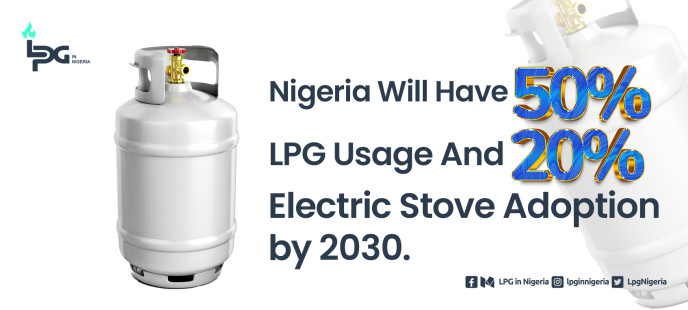- 4023
- 0
Sharing Ideas and Updates on LPG in Nigeria and related information to enable effective collaboration within the LPG Value Chain
Nigeria Will Have 54% LPG Usage And 20% Electric Stove Adoption By 2030

Nigeria is taking a significant step towards a cleaner and more sustainable energy future with the launch of its National Clean Cooking Policy. The policy, recently approved by the Federal Executive Council (FEC), sets ambitious targets to increase the use of Liquefied Petroleum Gas (LPG) to 54% and electric stoves to 20% of the total clean cooking energy mix by 2030. This initiative aims to reduce greenhouse gas emissions, improve public health, create jobs, and protect the environment.
Speaking on the policy, Minister of Environment Balarabe Abbas Lawal emphasized its alignment with Nigeria’s broader environmental and energy goals, including the Nationally Determined Contribution (NDC) target, the Energy Transition Plan, and the commitment to achieving net-zero emissions by 2060. The policy also includes targets for other clean cooking solutions, such as 13% fuel-efficient biomass cookstoves, 5% briquettes made from agricultural waste, and 3% biogas usage by 2030.
“The National Clean Cooking Policy is a critical component of Nigeria’s strategy to transition to a low-carbon economy,” said Lawal. “By increasing the adoption of LPG and electric cooking, we are not only reducing our carbon footprint but also creating approximately 10 million direct jobs for young people across the country. These jobs will span the entire value chain, from assembling raw materials to producing and distributing clean cookstoves.”
The policy’s implementation is expected to have wide-reaching benefits. By promoting the use of cleaner cooking technologies, Nigeria aims to mitigate the health risks associated with traditional cooking methods, such as the use of firewood and kerosene, which contribute to respiratory diseases, especially among women and children. Additionally, the shift to cleaner fuels is expected to reduce deforestation and other forms of environmental degradation, further supporting the country’s climate commitments.
The Ministry of Environment has already begun collaborating with local cookstove manufacturers and development partners, including the World Bank, to ensure the successful rollout of the policy. These partnerships are crucial for scaling up production, building local capacity, and securing the necessary financing to achieve the policy’s goals.
The National Clean Cooking Policy also recognizes the importance of state and local governments in its implementation. The policy will be transmitted to the 36 states and the Federal Capital Territory (FCT) for adoption and domestication. Key recommendations include raising awareness, integrating solutions, building capacity, and providing financial incentives to encourage the widespread adoption of clean cooking technologies.
In addition to its environmental and health benefits, the policy is expected to generate significant economic opportunities. By developing a robust market for clean cookstoves and other clean cooking solutions, Nigeria aims to diversify its economy, reduce energy poverty, and improve the quality of life for millions of households across the country.
As Nigeria moves forward with its clean cooking agenda, the National Clean Cooking Policy represents a vital step towards a more sustainable and prosperous future. By 2030, the country hopes to see a dramatic shift in how Nigerians cook, leading to a healthier population, a cleaner environment, and a stronger economy.
















0 Comment.